By any measure, comedic actor Adam Sandler has had a successful, if not interesting, career. His early roles promoted his unique brand of humor made famous on “Saturday Night Live” (think “Billy Madison,” and “Happy Gilmore”), while later attempts hinted at a more earnest veneer, such as “Big Daddy,” (1999) and “Anger Management” (2003). Sandler’s forays into more serious material, however, have been with mixed results. His role in the zany “Spanglish” (2004) showed an actor with emotive potential, while his role in the post 9/11 drama “Reign Over Me” (2007) was, honestly, depressing, somber, and a bit macabre. However, it can’t be overlooked that Sandler gives serious films his all. The 2006 comedy “Click” is honestly one of his best; though certain parts may be tilted a bit too extremely toward the depressing side for those looking for a quick, good laugh.
Sandler plays Michael Newman, an architect working his way up in a successful New York firm. His boss (played by David Hasselhoff) is a demanding and not-at-all-yielding tyrant who appreciates Michael for nothing. Dangling a promotion before his nose, Michael willingly works himself to death hoping to make partner, and earn his respect.

However, the respect comes at a price. He spends less and less time at home with his loving children and beautiful wife (Kate Beckingsale). His patience begins to wear thin, and he eventually snaps at his wife over the fact that he doesn’t own a ‘Universal Remote’ for the television because he feels it would make his life easier if he had one device to ‘do everything for him.’
He soon gets his wish. Falling asleep in a Bed, Bath, and Beyond, Michael meets a shady salesman (Christopher Walken), who gives him the ultimate universal remote. He doesn’t divulge its secrets right away, but Michael quickly discovers. It gives him the ability to pause life, fast forward unpleasant events (such as fights with his wife, being sick, waiting for a promotion, etc.), and it isn’t long before his life is filled with only those moments he truly enjoys.
Of course, the remote is only a metaphor for the breakneck, never-looking-back-speed Michael has lived his whole life. It isn’t long before he realizes he’s missing more than he bargained for. Skipping spousal fights, he learns, also comes with skipping the make-up sex (well, the foreplay at least; he uses the remote to skip through this ‘obligation’), and by skipping ahead to his promotion (which he thinks will only take a month; it ends up taking a year), he realizes he is quickly losing his marriage, and his family, to a remote control which seems to now have a mind of its own. However, as the salesman informs him solemnly, ‘the item is non-returnable.’
As “Click” takes on a decidedly bitter and, honestly, grim tone, one of the surprising high points of the movie is the acting of Kate Beckingsale. Somewhat frigid in other movies, such as “Laurel Canyon” (2002) and “Underworld” (2003), she changes suit here with one of the sweetest and heartwarming portrayals I’ve seen in a quite a while. She’s loving, supportive, and perfect – you’ll find yourself cursing Newman at multiple points during the movie. Can’t this guy just appreciate what he’s got? His children, as with his wife, ask nothing of him but his love – but he’s only got his eye on the prize. At any rate, if you didn’t like Beckingsale before, you’ll absolutely fall in love with her after seeing this movie.
However, one of the major strikes against “Click” is that it just doesn’t know when to quit. It’s a ‘What would life by like if’ movie. But unlike others of its ilk, such as “It’s a Wonderful Life” and “The Family Man,” it doesn’t have the good sense to wake the main character up after he’s learned from his mistakes. The movie simply tortures Newman, and the audience, with one major, life-altering tragedy after another until you’re hoping the poor guy will just end it all – both for his sake, and for ours. When you think he can’t sink any lower (and he asks himself multiple times “How much worse can it get?”), another brick is dropped on the poor guy’s head. Newman isn’t innocent, far from it; however I question the filmmaker’s distrust in the audience to understand that Michael’s choices led him to this point. We understand. By the 93-minute mark I honestly wanted to turn the movie off – because I was just too depressed to keep watching.
There is a catharsis, of course, but unlike the tragedies we have just witnessed, comes way too fast, and with more comic relief than was appropriate. Wading through literally 30+ minutes of dolor and despair, the 5 minutes of screen-time devoted to Michael’s inevitable awakening seems to fast forward much like most of his life in the movie; the ending rushes in before we’ve even had chance to catch our breath.
For all its’ faults, however, “Click” is not worth skipping altogether. It has its’ high points and its low ones. Michael’s is a character we can relate to. We may not all be mega-successful workaholics, but we all tend to be too focused on the future to appreciate the present. “Click” is a philosophical movie, and you’ll doubtless take a lesson from it. Performances from Christopher Walken, Kate Beckingsale, and Henry Winkler will make you smile. Adam Sandler honestly does a good job with the emotive acting required of the role, especially during the over-long second act when his life is falling apart. However, it would be nice to eventually see him in a serious drama that doesn’t rely on his slapstick hijinks for comedic relief. While entertaining, there are just some movies’ subject matter, and tone, for which such pratfalls are wholly inappropriate. “Click” is a major case in point.
-by Mark Ziobro